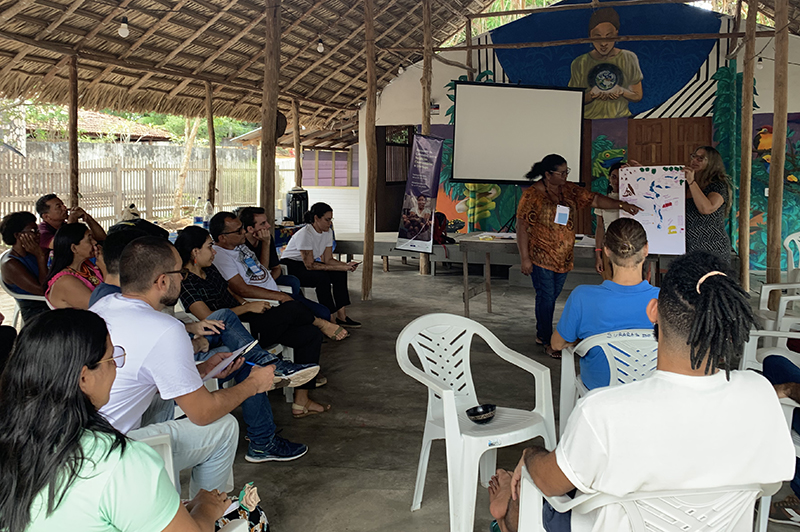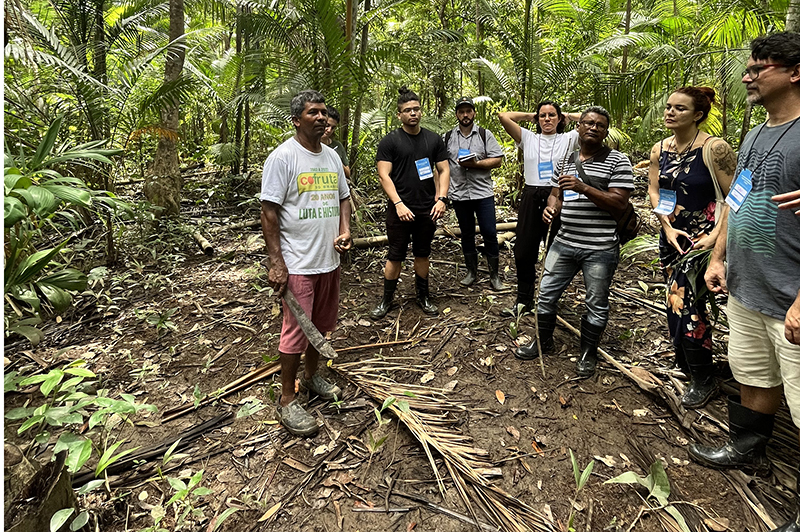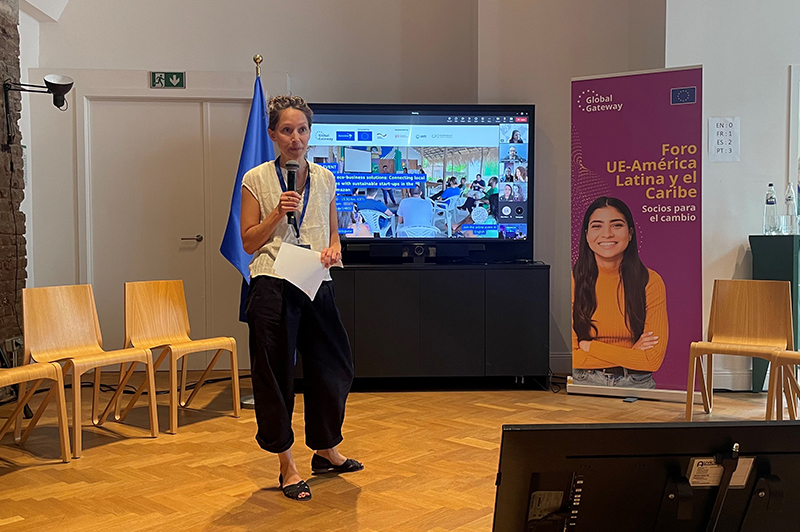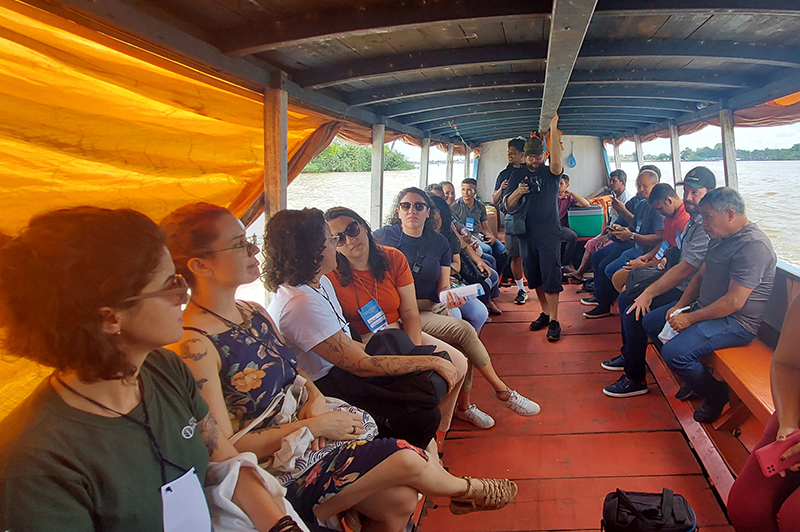The event was held at the EU-CELAC Forum and showcased the experience from the promotion of sustainable business models for the development of the Bioeconomy in the Amazon
July 14th, Brussels, Belgium. The partnership between the European Union and the Latin American and Caribbean region involves the active participation from key stakeholders like youth organisations, civil society, and local authorities. Recognizing the importance of collaboration and inclusion, the EU organized the EU-Latin America and the Caribbean Forum: Partners in Change in Brussels, Belgium on July 13th and 14th, 2023. This forum, attended by around 250 people participating in-person, was part of the broader EU-CELAC Summit, scheduled for July 17th and 18th, 2023. The primary objective of this forum was to foster an inclusive exchange with non-state actors, focusing on discussions about creating sustainable and inclusive futures for both regions.
During the EU-CELAC Forum, the Euroclima programme, cofinanced by the European Union and Federal Government of Germany through the Federal Ministry for Economic Cooperation and Development (BMZ), showcased an initiative that is being implemented in Brazil with the support of Deutsche Gesellschaft für Internationale Zusammenarbeit (GIZ). The primary objective of this action is to promote sustainable business models for the development of the Bioeconomy in the Amazon. The side-event entitled "Innovative eco-business solutions: Connecting local communities with sustainable start-ups in the Brazilian Amazon" held on July 14th, presented different perspectives and significant achievements of the initiative.
The panel had the participation of André Noronha, project Manager, Fundación CERTI; Paula Moreira - Project Manager, CONEXSUS, Danylla Cássia Sousa da Silva, representative of the responsible community business CoFruta and Sandra Zanotto, CEO, AmazonDoors. The side-event highlighted the action's significant contributions to tackling climate change and reducing biodiversity loss, while fostering the just socio-economic development of local communities in the Amazon.
About the action “Promote sustainable business for the development of the Bioeconomy in the Amazon”
GIZ in the framework of the Euroclima+ programme is supporting the implementation of an Action in Brazil to “Promote sustainable business for the development of the Bioeconomy in the Amazon.” The action is financed and supported by the Euroclima+ programme and implemented by two non-profit organizations CERTI Foundation and Conexus in partnership with the Brazilian Ministry of Development, Industry, Commerce and Services. Commencing in January 2022, the action has achieved considerable success and is set to enter its second phase, lasting for another two years, to consolidate and scale up the achievements of its initial phase.
The primary focus of the action is to foster innovation and engagement of local communities with start-ups to contribute to develop fair and socio-environmentally responsible bioeconomy models, with the overarching goal of conserving the biodiversity and ecosystem of the Amazon forest. It put in place a matching mechanism centred on the needs of community businesses that is strategic to a territorial development model based on communities’ bioeconomy. This collaborative effort has contributed to enhancing opportunities for sustainable eco-business development in the region driven by local communities' initiatives. As emphasized by Andre Noronha, CERTI's project manager:
"This project and collaboration have been achieved by thinking about new solutions as a way to develop production chains and, consequently, bioeconomy in a sustainable and fair way, enhancing the development of community-based businesses here in the territory while thriving forest conservation".
 |
 |
|
The success of the action in promoting eco-business model in the Brazilian Amazon was achieved through a living lab approach, facilitating the interaction between 10 community-based businesses and 10 start-ups. This methodology has been instrumental in bridging the gap between community businesses and start-ups. Paula Moreira, Project Manager, CONEXUS recognizes the challenging task to reconcile these diverse viewpoints between community businesses and start-ups, as they are often conceived as different worlds. Through virtual interactions, interviews, presentations, and bilateral conversations, the start-ups and community businesses were able to get to know each other better and identify potential collaboration. The real breakthrough occurred when the start-ups visited the community-based businesses, allowing them to co-create and co-design their working plan and conceptual prototypes. This facilitated the assistance to community-based businesses and created synergies, paving the way for long-term relationship for sustainable bioeconomy business models in the region. Examples of this effort are the successful collaborations that the representatives participating in the event, CoFruta (as a community-based business) and AmazonDoors (as a start-up), have developed with their matching partners, resulting in agreements for the development of 2 out of the 10 prototypes that will be developed in the project's first phase.
Potential for scaling up the project and second phase
As the action moves into its second phase, there is a vision to expand the approach and replicate its success in other territories within the Amazon region. Efforts are focused on guiding the process towards technological innovation, recognizing that this aspect can often pose challenges when scaling up eco-business initiatives. However, with the collective dedication and determination of all involved stakeholders, this endeavour has already enriched opportunities for sustainable eco-business development, prioritizing the needs and opportunities of the local communities at its core. By continuing to empower and collaborate with local communities, the action aims to pave the way for fair and socio-environmentally responsible bioeconomy models while informing public pol icy. Certainly, capitalizing on good practices and enabling factors that support eco-business development in the Amazon forest is aligned with Euroclima's commitment to contribute to the Brazilian Nationally Determined Contributions (NDC). In that sense, the project aspires to promote the integration of the results of this initiative into broader public policies. Through the collaboration with the Ministry of Development, Industry, Trade and Services (in portuguese Ministério do Desenvolvimento, Indústria, Comércio e Serviços, abbreviated MDIC), it will be possible to disseminate this knowledge and contribute to the improvement of governmental strategies for the development of the bioeconomy in the Amazon region while considering local communities needs and opportunities. This alignment with larger policy frameworks will reinforce the impact of our action and its potential to drive positive change in the Amazon region.
ABOUT EUROCLIMA
Euroclima is the European Union´s (EU) flagship Programme for green action to all 33 countries across Latin America and the Caribbean (LAC) that contributes to the implementation of the Global Gateway agenda in the region. After over 13 years of successful implementation, Euroclima launched in 2023 a renewed version of the Programme resulting in a vehicle of the EU and LAC partnership to tackle the planetary crisis by joining efforts for a common path towards a green and just transition.
Euroclima is a 105 million Programme co-funded by the EU and the German federal government through the Federal Ministry for Economic Cooperation and Development (BMZ). Its projects and actions are implemented by the Agencia Española de Cooperación Internacional para el Desarrollo (AECID), Agence française de développement (AFD), Economic Commission for Latin America and the Caribbean (ECLAC), Expertise France, Fundación Internacional y Para Iberoamérica de Administración y Políticas Públicas (FIIAPP), Deutsche Gesellschaft für Internationale Zusammenarbeit (GIZ) GmbH, United Nations Development Programme and United Nations Environment Programme (UNEP).

